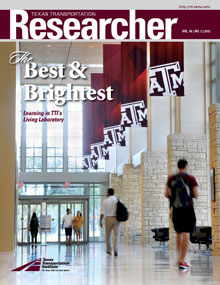For nearly 25 years, the Southwest Region University Transportation Center (SWUTC) has worked to develop transportation solutions and attract some of the best and brightest students into becoming the next generation of transportation leaders. Now the SWUTC is poised to continue its legacy by renewing its grant and adding two schools to its consortium.
Officials with the U.S. Department of Transportation’s (USDOT’s) Research and Innovative Technology Administration met with the Texas Transportation Institute (TTI) and other the SWUTC consortium members on March 21 in College Station, Texas, to officially kick off the grant. TTI leads the consortium that includes Texas A&M University, The University of Texas at Austin, Texas Southern University (TSU), Louisiana State University (LSU) and the University of New Orleans (UNO).

“One of the things we find particularly energizing is that our consortium has added two schools from Louisiana — LSU and the University of New Orleans,” says SWUTC Director Dock Burke. “These schools offer some very high-quality resources in terms of their faculty, students and some of their ongoing programs, particularly in terms of hurricane evacuation modeling techniques and rebuilding. We believe the entire Gulf Coast will benefit from this new alliance.”
The original alliance has its origins in 1987, when the Surface Transportation and Uniform Relocation Assistance Act authorized the creation of the USDOT University Transportation Centers (UTC) program. Soon after, transportation centers across the nation began operation at universities in each of the 10 federal regions through a federal grant, with dollar-for-dollar matching funds from nonfederal sources required. The SWUTC was established at The Texas A&M University System in October 1988 and has been continuously headquartered at TTI in College Station on the main Texas A&M University campus.
“When we competed for this grant, we were asked to look at the overall priorities of the national transportation program, and see if we could find within those priorities a place to do our work,” says Burke. “When you consider our consortium members, we have a critical mass of expertise that can address almost any topic you could conceivably think of in transportation. What we are focused on for this upcoming year is funding research proposals in each of the five USDOT-outlined goals to improve safety, competitiveness, sustainability, state of good repair and livability. We are getting good response and have research projects selected and under way, especially at TTI. We hope to have the full research program in place with the remaining members of the consortium by the beginning of the summer.”
In addition to transportation research and technology transfer, the third mission thrust of the SWUTC is to prepare young leaders for future transportation challenges. “When we were originally founded 25 years ago, the transportation industry was losing top-quality engineering graduate students to computer and electrical engineering, which were more attractive and higher-paid professions,” explains Burke. “So we started a scholarship program that’s been very successful nationwide at populating the leadership of the transportation sector with very bright graduates who are alumni of this UTC program.”
Currently, the transportation industry is experiencing a normal attrition of the top leadership in government, education and the private sector. “So now there’s an opportunity to graduate more and better students to take on those responsibilities,” says Burke. “We’re encouraged that what may have been a long-term decline in the transportation workforce sectors is now an opportunity to put our graduates to work in highly responsible positions in the industry.”
One of the enhancements to the SWUTC under the new grant is the establishment of a dissertation research program within Texas A&M’s Zachry Department of Civil Engineering (CE) that competitively select Ph.D. candidates.
“These are going to be research projects that will serve as our Ph.D. students’ dissertations,” explains SWUTC Associate Director Gene Hawkins, also an associate professor in CE. “We have set up a process by which we will evaluate research proposals for these Ph.D. students and competitively select several of them for funding.”

